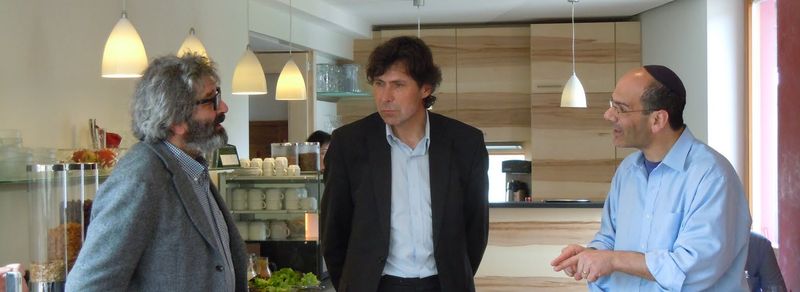The Oberammergau Passion Play: FAQs
What is a Passion play?
A Passion play is a dramatic representation of the trial, suffering, death, and resurrection of Jesus. While “Passion” is a Christian theological term used to express Jesus's spiritual, emotional, and physical pain before and during the crucifixion, Passion plays also portray events earlier in Jesus's life. Passion plays are often more than stage drama: for many who watch them, they serve as opportunities for religious devotion and meditation and act as powerful symbols of the core of Christian spiritual life. Those who write Passion plays tend to draw from a mixture of the four Gospels of Christian scripture, rather than using a single Gospel account to stage Jesus's final days. Passion plays are usually performed around the time of Easter, the Christian holiday which remembers Jesus's death and resurrection. Artistic interpretations of the Passion have also taken musical and cinematic form, such as in the St. Matthew and St. John Passions of J.S. Bach (1685 – 1750) and in Mel Gibson’s film The Passion of the Christ (2004). Although Passion plays reached the peak of their popularity in Medieval Europe, they are still enacted today, most famously in Oberammergau.
What is the Oberammergau Passion Play?
According to the Oberammergau tradition, Oberammergauers promised in 1634 that they would perform a Passion play “in perpetuity” if God would spare their village from the bubonic plague. From that day onwards, the account holds, not a single resident of Oberammergau died from the plague. With rare exception, the Passion play has been performed at least every ten years since 1634, and has come to be the defining feature of the village. Each decade, more than half of the village’s residents (about 2,500 men, women, and children) take part in the play. It is undoubtedly the most well-known and influential Passion play today.
Why are Passion plays problematic for concerned Christians and Jews?
Historically, Passion plays have often charged Jews – individual Jews, groups of Jews, and collective Jewry – with the death of Jesus. In connection with this claim, the plays have frequently perpetuated negative stereotypes of Jews, including portraying them as diabolical and obsessed with money. In the past, Passion plays have incited acts of anti-Jewish violence. They continue to pose significant challenges for concerned Christians and Jews today.
What made the Oberammergau Passion Play particularly problematic?
Passion plays can convey anti-Jewish sentiments in a number of ways. As recently as 1984, the Oberammergau Passion Play, for example, dressed some of its Jewish characters in horned costumes which represented the Jews’ conspiracy with the Devil. Many argue that Oberammergau’s treatment of Pontius Pilate – the only individual who actually had the power to condemn Jesus to death – is overly sympathetic, and places too much of the blame for Jesus's crucifixion in the hands of Caiaphas, the Jewish high priest, and other Jewish leaders.
Most problematic for Oberammergau has been the play’s contention of collective Jewish guilt for Jesus's death. Until the 2000 production, the Jewish crowd affirmed that “his blood be upon us and upon our children” (Matthew 27:25) at the scene of Jesus's condemnation. Under significant pressure from those who considered the line a blatant charge of deicide against the Jews, Oberammergau’s leaders removed the line from the script. Even without this troublesome line, Jewish and Christian leaders note that the overall effect of the 2010 Passion Play was still problematic in this respect. The Jewish crowd’s powerful cries to “Crucify him!” in the most recent (2010) production create a lingering sense that the Jews are responsible for Jesus's death. Such sentiments run contrary to several pronouncements of the Catholic Church on this subject, including the 1965 Nostra Aetate document, which declared that “what happened in [Jesus's] Passion cannot be charged against all the Jews, without distinction, then alive, nor against the Jews of today… The Jews should not be represented as rejected or accursed by God.” Notably, Jewish and Christian observers remarked that over the course of the 2010 Oberammergau Passion Play season, the staging increasingly emphasized voices of dissent among the Jewish crowd, creating a more balanced impression of the play’s most controversial scene.
Oberammergau’s history of Nazism casts significant shadows over its Passion Play. Hitler attended the 1930 and 1934 productions, and proclaimed in 1942 that it represented the “muck and mire of Jewry” so “convincingly” that it should continue far into the future. In addition, the conservative Bavarian village housed a number of Nazi supporters, many of whom were highly active in the play’s leadership during – and even for decades after – the Nazi era. Modern critics and reformers of the Oberammergau Passion Play must continue to incorporate the village’s worrisome history into their efforts to transform the play into a production devoid of any anti-Jewish elements.
What positive changes have been made in the Oberammergau Passion Play over the last few decades?
Since the 1990 production, the following improvements have resulted from AJC’s collaborative efforts with Oberammergau leadership, concerned Christians, Bible scholars, and other Jewish organizations:
-
The Jewish crowd’s pledge that the blood of Jesus “be upon us and upon our children” (Matthew 27:24-25) has been removed from the script, since it has been overwhelmingly interpreted as implying that the Jews are collectively (and perpetually) responsible for Jesus's crucifixion. The Catholic Church, in Nostra Aetate (1965) and subsequent pronouncements, has similarly indicated that nothing in the Passion story should be used to charge the Jews – at the time of Jesus's crucifixion and/or in future generations – with Jesus's death.
-
The character of Judas Iscariot, who is often portrayed as betraying Jesus in exchange for money, and thereby as a Jewish stereotype, is instead shown to be a pawn of those who plotted Jesus's death.
-
Jesus is clearly identified as a Jew: other characters call him “Rabbi,” he holds a Torah prop aloft and leads the people in reciting the Shema prayer; he recites traditional blessings over bread and wine; and his “Last Supper” is depicted as a Passover seder.
-
The horned costumes of the Jewish priest characters have been eliminated, as have many negative stereotypical gestures and mannerisms by Jewish characters.
-
The first-century Jewish community of Jerusalem is no longer monolithic: now it is depicted as more diverse, and it includes the voices of Jesus's Jewish supporters.
-
The play suggests that Pontius Pilate, the Roman governor, had political motivation to try and crucify Jesus.
-
Most of the supersessionist tableaux vivants (living images) have been removed or replaced by more positive Old Testament scenes.

Interreligious and Intergroup Relations Rabbi Noam Marans
*Photo credit: Matthew Ladin
The Oberammergau Passion Play is one example of a shift in Catholic-Jewish relations. Where can I learn more broadly about Catholic-Jewish relations?
-
Declaration On The Relation Of The Church To Non-Christian Religions: Nostra Aetate.
The declaration of Nostra Aetate at the Second Vatican Council on October 28, 1965, positively transformed Catholic-Jewish relations. Nostra Aetate proclaimed that not all Jews, then or now, can be charged with Jesus's death. Additionally, Nostra Aetate stated that Jews are not rejected by God, even though the Church is the new people of God. The document also decries antisemitism.
-
Guidelines and Suggestions for Implementing the Conciliar Declaration Nostra Aetate, No. 4.
(December 1, 1974).Almost ten years after the Second Vatican Council, the Vatican Commission for Religious Relations with the Jews published a document with practical ways to implement Nostra Aetate. The document advised Christians to learn more about Judaism by engaging in dialogue with Jews, and to pay attention to how Jews are portrayed in Christian education. Finally, the document called on Christians to work with Jews on social justice initiatives.
-
Notes on the Correct Way to Present the Jews and Judaism in Preaching and Catechesis in the Roman Catholic Church. (June 24, 1985).
In 1985, the Vatican Commission for Religious Relations with the Jews issued a document entitled “Notes on the Correct Way to Present the Jews and Judaism in Preaching and Catechesis in the Roman Catholic Church.” The purpose of the document was to clarify how to educate Christians to respect and understand Jews and Judaism, as a result of Vatican-issued documents such as Nostra Aetate and “Guidelines and Suggestions for Implementing the Conciliar Declaration Nostra Aetate, No. 4.”
-
In 1988, in light of documents issued by the Vatican, the Bishops’ Committee for Ecumenical and Interreligious Affairs issued its own document on how to present Jesus's crucifixion and resurrection. The committee made clear the importance of presenting Jews without prejudice. The document also clarified that the four Gospels should be read as “sacred history,” as opposed to a literal historical account of events, and emphasized that when presenting Jesus's death, the focus should be on “a profound self-examination of our guilt, through sin, for Jesus's death.”



